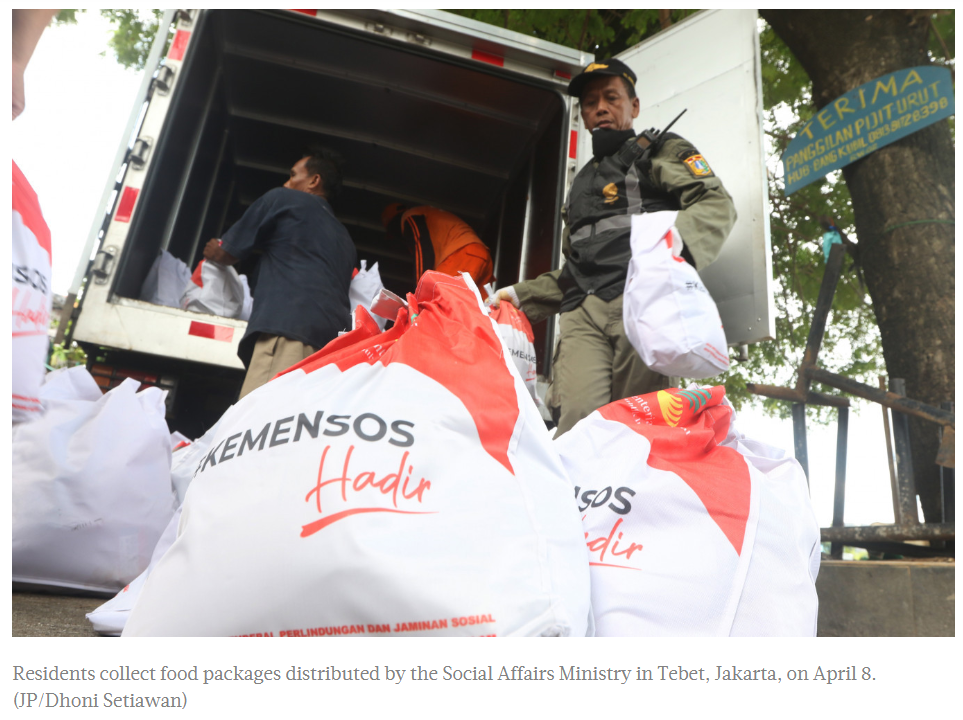Indonesia: Social protection, food supply crucial to prevent unrest amid pandemic: Economists
The government’s ability to provide social protection and ensure undisrupted food supply will be crucial in preventing social unrest as the COVID-19 pandemic is expected to hit households and workers hard, economists have warned.
Former Finance Minister Chatib Basri said the government should be able to provide cash transfers for affected citizens, adding that it would need to ensure the availability of food supplies to prevent massive demonstrations such as those during the 1998 Asian financial crisis.
“The government needs to focus on those two issues otherwise it will trigger social unrest,” Chatib told a discussion held by the Foreign Policy Community Indonesia (FPCI) on Monday.
The economist said the government should also prioritize the healthcare sector to contain the outbreak, adding that the tighter containment measures, such as large-scale social restrictions in Jakarta, called for cash transfers from the government to aid vulnerable households.
“Containing the outbreak should be the first priority because if people get sick and they cannot work, the economy will get hit anyway,” Chatib said. “But it comes with consequences too. As the country requires people to stay home, we need to compensate them.”
The government has set aside Rp 436.1 trillion (US$26.36 billion), equivalent to 2.5 percent of the country’s gross domestic product (GDP), for stimulus packages that are focused on healthcare spending, social protection and economic recovery programs.
It projects the country’s economic growth to slow to 2.3 percent this year under the baseline scenario, which would be the worst since 1999, and even contract 0.4 percent in the worst case scenario as the pandemic hits demand and disrupts business activity.
Many companies might not be able to pay debts for the next three to six months due to financial pressures caused by the pandemic, Chatib said.
“The government must also step up interventions for banks to not stop credit line as there is a risk of massive unemployment,” he said, adding that the government had focused its stimuli on the urban population to prevent the spread of the virus.
“If there is not enough stimulus in urban areas, they will go to rural areas but health facilities in rural areas are very poor so it would no longer be possible to control the virus spread”.
The highly contagious pneumonia-like illness has infected more than 4,500 people on Indonesian soil and killed almost 400, according to official data announced on Monday afternoon. President Joko “Jokowi” Widodo has declared a public health emergency and stated the pandemic is a national disaster, as large-scale social restrictions have been implemented in several regions with a high number of confirmed cases.
A recent report by a London-based business consulting group, the Economist Intelligence Unit (EIU), stated that the government had to make the case for a lockdown in Indonesia as the pandemic is projected to overrun the country’s health systems and put a strain on the economy, warning of a potential unrest. Indonesia, it added, did not have enough resources and lacked the ability to contain the COVID-19 spread.
“The possibility of social unrest is high,” it wrote. “It is essential that the government makes the case for lockdowns with clarity, precision and sensitivity, or else a greater number of lives will be lost.”
The EIU also projected that COVID-19 would severely disrupt the Indonesian economy despite coordinated and swift responses from the government and Bank Indonesia (BI) to anchor the economy.
The World Bank estimated in March that the pandemic would slash Indonesia’s economic growth to 2.1 percent under the baseline scenario, down from 5.1 percent projected initially, if the situation started to normalize by June. It also warned that the disruptions would throw millions of people into poverty.
The pandemic has upended supply chains, forcing companies to lay off employees and crushed demand for goods as consumers stay at home and increasingly worry about job prospects, reining in consumer spending, which accounts for nearly 60 percent of Indonesia’s GDP.
As many as 2.8 million people had lost their jobs as of Monday, according to data from the Manpower Ministry and the Workers Social Security Agency (BPJS Ketenagakerjaan). More than half were furloughed and place on paid or unpaid leave.
“We are in uncharted waters because the virus is a combo of different shocks altogether, hitting the demand and supply sides,” United Overseas Bank (UOB) economist Enrico Tanuwidjaja said during the same online discussion with Chatib.
“Government spending [to finance stimulus] will have very limited firepower unless the country earned loans or even swap lines.”
Source: https://www.thejakartapost.com/news/2020/04/14/social-protection-food-supply-crucial-to-prevent-unrest-amid-pandemic-economists.html


 English
English




